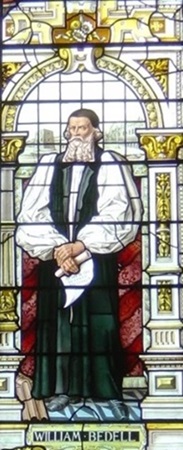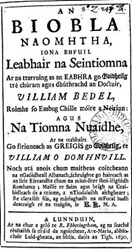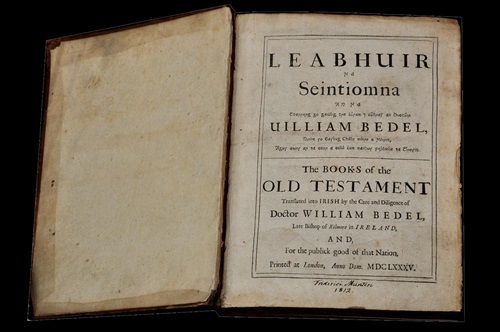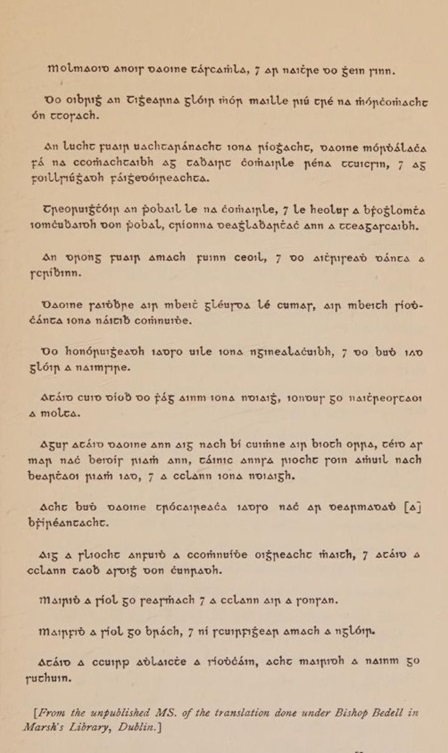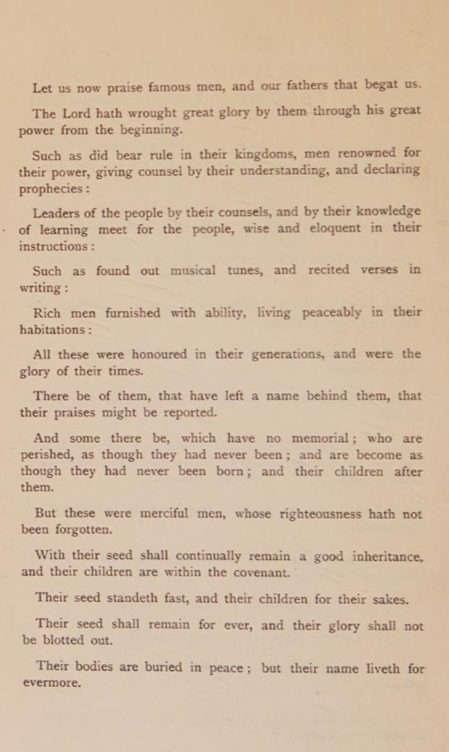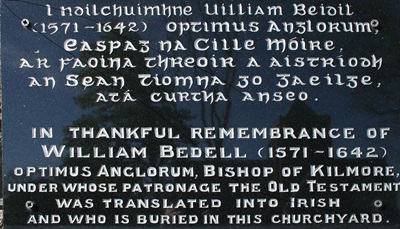Life
| 1571-1642 [Bishop Bedell; var. Bedel]; b. Black Notley, nr. Braintree, Essex; hearing permanently impaired by a blow from a school-master; schol. Emmanuel College, 1585 [aetat. 12], MA, 1592; fellow, 1593; ord. 1597, BD, 1599 [DD, 1602]; appointed to church of St Mary’s, Bury St Edmund’s, 1602-07; chaplain to Sir Henry Wotton in Venice, 1607-10 - where he first encountered and collected Hebrew books in the Jewish ghetto including a MS Hebrew Bible now held at Emmanuel College, Cambridge (MS I.I.5–7); moved from his original Puritanism to a more ecumenical theology in Venice; appt. rector at Horningsheath, 1616; appt. 5th provost of TCD, 1627, succeeding Sir Wm. Temple at his death; introduced the Irish language to the syllabus and restored discipline to chapel attendance [college prayers]; appt. bishop of Kilmore and Ardagh, Co. Longford, against initial resistance of Archbishop James Ussher - who was warned of possible usurpation, 1629; later quarrelled with Ussher about a diocesan chancellor Cooke, whom he sought to dismiss, and pluracies supported by Ussher; |
|
|
| issued Aibigtir .i. Theaguisg Cheudtosugheadh an Chríostaidhe [A.B.C. or the Institution of a Christian] (1631), a catechism containing biblical extracts in Irish; proposed translation of the entire Bible into Irish to complement Uilleam Ó Domhnaill’s translation of the New Testament (1602) at a Church Synod Lord-Lieutenant Wentworth, 1634; employed Muircheartach Ó Cionga [Murtagh King], commended by Primate Ussher; also Séamus Ó Nógla [James Nangle], as assistant to the former in making a translation based on King James Bible (1611); reviewed and corrected their work with reference to Hebrew original given him in Venice, the Latin Vulgate of St. Jerome, and an Italian translation by Giovanni Diodata; resigned the see of Ardagh, 1633; suffered the death of his wife and preached her funeral oration, 1639; the Old Testament translation was completed in 1640; | ||
| sent to Holland for fonts (‘stamps’) but overtaken by the Rebellion of 1641; sheltered Protestant fugitives from the rebels; imprisoned in Loughoughter; transferred to the keeping of an tAthair Donnchadha Ó Sioradáin [Dennis Sheridan; var. Denis; O’Sheridan] at Dromlor, where many refugees shared the accommodation; died there from fever, presumably contracted in prison, 7 Feb. 1642; manuscripts from his house which were saved by Sheridan incl. his Hebrew Bible and the original of his Irish translation through his friendship with its then incumbent and occupant, Bishop Eoghan Mac Suibhne; Bedell was honoured by a military guard at his funeral eliciting Ó Síoradáin’s celebrated graveside encomium (‘sit mea anima cum Bedello!’); | ||
| his translation brought to publication by Archbishop Narcissus Marsh with Andrew Sall and Paul Higgins (both Jesuits and scholars), published by Robert Everingham, London 1685, together with a republication of Daniel’s New Testament (1681), assisted financially by Robert Boyle, who had an Irish font based on “Louvain A” specially designed and cut by the type-founder Moxon; the resultant book known as “Bedell’s Bible”; the MS of which [“His Originall Copy”] is held in Marsh’s Library, Dublin; there was an early life by Bishop Burnet (1685) while Coleridge called him ‘the most faultless character in all ecclesiastical history’; there is a bilingual plaque at the ruins of Kilmore Cathedral; Saint Feithlimidh‘s Cathedral, Kilmore, was built as memorial; a stained glass portrait is paired with that of William Sancroft in Emmanuel College Chapel (Oxford). ODNB DIB FDA OCIL |
[ top ]
Works[ top ]
Criticism
|
|
|
[ top ]
Commentary
Bishop Gilbert Burnett, Life of Bedell (1685): ‘Doctor Bedell, Bishop of Kilmore, when a prisoner with the insurgents, who doubtless had [300] many priests among them, was never interrupted in the exercise of his worship, although not only his house and all the out-buildings, but also the church and church-yard, were full of people that flocked to him form protection. so that, from the 23rd of October, to the 18th of December following, he, and all those within his walls, enjoyed, to a miracle [says Bishop Burnet] perfect quiet. And when he died at the age of 71, the titular bishop of that diocese, though he had proselytised his brother, a popish priest, to the communion of the established church, suffered him to be buried in consecrated ground, the Irish doing him unusual honours at his funeral. For the chiefs of the insurgents having assembled their forces, accompanied his body to the church-yard with great solemnity; and desires Mr. Clogy, one of his chaplains, to bury him according to the church offices. At his interment they discharged a volley of shot, crying out in Latin, “Hic requiescat ultimus Anglorum!”, may the last of the English rest in peace! Edmund Farilly, a popish priest, exclaimed at the same time, “O, sit anima mea cum Bedello!” Would to god that my soul were with Bedell.’ (Cited in Daniel O’Connell, Memoir, pp.300-01, where it is called ‘this affecting account’, and educed as proof that the Irish ‘treated him [Bedell] with kindness’ and regarded him as ‘a most humane and worthy man’, and finally that he suffered no hard in their hands ‘during the worst part of the insurrection’. (Burnet, n.p.; quoted in Daniel O’Connell, Memoir, 1828, op. cit., pp.300-01.)
| Sir Henry Wotton’s letter to the King of 1627 commending Bedel for the Provostship of TCD |
|
| May it please Your most Gracious Majesty, |
|
|
| Walton’s commentary: |
|
| —Extracts supplied by Frank Callery on Facebook (29.01.2015.) |
| —Quoted in Izaak Walton,
Reliquiae Wottonianae Or, A
Collection
Of Lives, Letters, Poems;
With
Characters
Of
Sundry personages:
And other Incomparable Pieces of
Language and Art.
Also Additional Letters to Several
Persons, not before Printed.
By The
Curious Pencil of the Ever Memorable
Sir Henry Wotton Kt.
Late Provost of Eaton College. The Third Edition, with large Additions
(London,
Printed by T. Roycroft, for R. Marriott,
Tyton, T. Collins, and F. Ford, 1672). |
[ top ]
Christopher Anderson, Historical Sketches of the Native Irish and Their Descendants [2nd Edn., Enl.] (Edinburgh: Oliver & Boyd, Tweedale-Court and Simpkin & Marshall, London 1830) - Chap.: “Literary History”: ‘[...] With deep regret Bedell now observed the neglect and contempt with which the native Irish had been treated, as though they were incapable of culture, or only could be restrained by force, or ruled by harsh measures. Clearly perceiving the path of duty, and firmly resolved to pursue it, it was his determination that the Book of Life. should be given to his Irish fellow-subjects, and that they should hear with their ears the glorious Gospel of the blessed God in their own ancient and long-proscribed language. Above thirty years before, the New Testament had been published : Bedell resolved to give the whole Bible to the people in their native tongue. See, then, this interesting man, now in his sixtieth year (1630), sitting down to acquire the language spoken around him, and succeeding so well as not only to com- pose a complete grammar, but to attain a critical knowledge of it. After much inquiry, he found a Mr King, already mentioned, ten years older than himself, who was reputed the best Irish scholar of his day. Providing for his support, and engaging also the Rev. Dennis O’Sheriden, the father of one of Bedell’s successors, they commenced the translation of the Old Testament, The Bishop’s favourite study, for many years, had been the Scriptures, so that the Hebrew and Septuagint were as familiar to him as the English. Every day, after dinner or supper, a chapter of the Bible was read at his table, whoever were present; when Bibles being placed before each individual, the Hebrew or Greek was laid before himself; and, since he had succeeded so well with the native language, as he compared the Irish translation with the English, so he compared both with the Hebrew, the Septuagint, and with the Italian version of his friend [59] Diodati, which he highly valued. For these comparisons of the text Bedell was peculiarly qualified. Latin and Italian he wrote with great elegance; and his perfect acquaintance with the latter, acquired from Sarpi at Venice, he could now turn to some good account.* There, also, he had studied the Hebrew language under Rabbi Leo, the chief Chachan of the Jewish synagogue, from whom he acquired the accurate pronunciation. During his past life, also, he had collected a large mass of critical exposition; and now, impressed with a con-viction of the supreme importance of the work he had undertaken, he pursued it with unwearied diligence. “He thought,” says his biographer, “the use of the Scriptures was the only way to let the knowledge of religion in among the Irish,” and he used to repeat a passage of a sermon that he had heard at Venice by Fulgentio, with which he was much pleased. It was on these words of the Saviour, “Have ye not read in the Scriptures?” and so the preacher took occasion to tell the auditory, that if Christ himself were now to ask this question, “Have ye not read in the Scriptures?” all the answer which they could make to it was, No; for they were not suffered to do so. (pp.59-60; footnotes here omitted.)
Further (Anderson, Historical Sketches, 1830): ‘Bedell, however, though so meritoriously employed, was now about to witness in Ireland the effects of a blind and misguided policy, which, indeed, has long survived him. In a convocation held at Dublin, in 1634, the fifth year of his incumbency, amongst other subjects the version of the Scriptures and Prayer-Book for the use of the Native Irish was introduced, when no small debate ensued. Bramhall, Bishop of Derry, stood forth in opposition, while Bedell appeared for the affirmative; the former grounding his argument on politics and maxims of state, and especially on the act of King Henry VIII, and the latter founding his on the principles of theology and the good of souls. Bedell, seconded by Ussher, prevailed, and the convocation passed the following canons: “Where most of the people are Irish, the church- warden shall provide, at the charge of the parish, a Bible and two Common Prayer-Books in the Irish tongue.” “Where the minister is an Englishman, such a clerk may be chosen as shall be able to read those parts of the service which shall be appointed to be read, in Irish.”
In following up these canons, no one exerted himself with so much zeal as Bedell. Already he had composed a short catechism, which he had printed in one sheet, English and Irish, in parallel columns, containing the elements of Christianity, several forms of prayer, and some of the most instructive passages of Scripture. These he widely dispersed, for they were received with joy by the Irish, many of whom now seemed to be hun-gering for the bread of life. The Irish Bible required by the canon was not yet, of course, in existence; but the Prayer-Book in Irish he ordered to be read in his [61] cathedral every Sabbath, for the benefit of countrymen who had assembled there, while he himself never failed to attend.’ (pp.60-62.)[...]
‘In past ages, there is certainly no man who ought to be held in higher veneration by the Native Irish, than William Bedell. At the commencement of his labours among them, the prospect was such as would have sickened most men, yet his subsequent residence of twelve years was one continued and energetic struggle for their salvation. To say nothing of his singular humility or undaunted courage, his unexampled disinterestedness in regard to his own income, or his generous hospitality to the poor and needy; never let them forget that he felt bound to their best interests by an indissoluble tie, so that when even an English bishopric was offered to him, he refused it! But, above all, let his pleadings in high places, in that early day, on their behalf, and his unwearied exertions, at an advanced age, in procuring for them the book of God in their long-proscribed language, be cherished with grateful remembrance. These render him the brightest star which ever rose on the gloom of their sorrow. [70]
Yes, the period after Bedell’s death was indeed in every sense gloomy. He was taken away from the evil to come, and it is marvellous that his translation was preserved, as by far the largest proportion of his papers and books were lost or destroyed. Not one step, however, was taken either in printing his manuscript of the Old Testament, or reprinting the New, for about forty years. Nay, the Irish types which had been sent over by Elizabeth, and used for printing the New Testament, after passing from the hands of one King’s printer to another, owing to the cupidity of one party into whose possession they had come, were secured by the Jesuits, and by them carried over to Douay, for the express purpose of promoting their own views in Ireland through the medium of the Irish language.’ (pp.70-71; available at Internet Archive - online. Notification of this source supplied by Frank Callery.)[ Note: The fate of Bedell is narrated in the interim pages, and following the history of the Irish font sent by Elizabeth, their use for Kearney’s Catechism before they being ‘secured by the Jesuits, and carried over to Douai’ during the Rebellion, the making of new fonts in London for Richard Boyle in 1680 is recounted. ]
[ top ]
Thomas Moore, History of Ireland, Vol. IV (London 1846): ‘That learned and amiable prelate, William Bedell, bishop of Kilmore, was at this time [1641] in the county of Cavan, and, though a dignitary of the church hostile to them, was trated by the insurrgents with every amrk, not merely of respect, but affectionate reverence. His was the only house in the country that during that time remained unviolated; and it was filled with people who fled to him for shelter. He, and all those within his walls, says his biographer, bishop Burnet, “enjoyed to a miracle perfect quiet.”’
Gordon Rupp, A Commemorative Lecture at Emmanuel College Cambridge (Cambridge: CUP 1972), 14pp., recounts that Bedell was English born, held chaplaincy at Venetian Court and involved in some anti-Catholic intrigues; after small retirement living back in England, appointed Provost of TCD and cleaned up the Constitution; later Bishop of Armagh [sic], did good works, struggled with pluracy; at Trinity [TCD], he continued the translation of the Bible into Irish, having learnt Irish and written a grammar in order to communicate with the Irish; disagreed with Ussher on the Irish language question; died of typhus during imprisonment in the 1641 Rebellion; his funeral guard was made up of Catholic soldiery, who pronounced a eulogy to him. Called the ‘angelic doctor.’ [Vide William Daniel, q.v., who is also asserted to have to have translated first New Testament into Irish.]
Sean O’Casey: ‘Ireland is a kaleidoscope of amazing contrasts. she is the oldest civilisation in Europe, though she is still in her teens ... A nation of Roman Catholics who abominate proselytism, but whose army and clans carried to the grave, with dirge of squealing pipe and beat of muffled drum, the body of the most proselytising English bishop [who] ever usurped a See in Ireland [i.e., William Bedell], chiefs weeping over his grave, and hoping that they would as fair a chance of heaven as the English bishop had [... &c.]’ (Notice in Leslie Daiken, ed., ‘They Go, The Irish: A Miscellany of War-Time Writing, London: [Ivor] Nicholson & Watson 1944, p.7.)
John Eglinton, Bards and Saints [1906; facs. rep.] (Folcroft Library 1975), comments on the repudiation of Bedell’s Bible, which might have established the firm tenure of an evangelical movement in Irish, had it not been opposed by the Catholic clergy. (p.22.)
Joseph Th. Leerssen, Mere Irish & Fior-Ghael: Studies in the Idea of Irish Nationality, Its Development and Literary Expression Prior To The Nineteenth Century (Amsterdam & Philadelphia: John Benjamins Pub. Co. 1986), gives account of Bedell’s small catechism with scriptural passages and prayers in Irish, 1631; further remarks on his trans. of Old Testament with co-operation of Murtagh King and James Nangle, and an account of his funeral when a Catholic priest exclaimed at the graveside, ‘Sit anima mea cum Bedello!’, Notes that James Ware was his protégé, while Narcissus Marsh, TCD Provost, 1679, saw Bedell’s Old Testament (1685) through the press together with a republication of Daniel’s New Testament (1681), supported by Robert Boyle who had a new font cut (p.329-30).
Norman Vance, Irish Literature: A Social History (Oxford: Basil Blackwell 1990), p.29; gives account of Bedell’s scheme to produce composite language; his ‘universal character’ project, shared with Rev. John Johnston of TCD, to be called ‘Wit-Spell’, known and encouraged by Hartlib; manuscript, complete in 1641, torn up by suspicious Franciscans, and plates used by tinkers; rough draft brought to Oxford by Johnston’s widow, c.1650. Bibl. cites James Knowlson, Universal Language Schemes in England and France 1600-1800 (Toronto UP 1975), pp.9f., 76-86.
[ top ]
|
||||
Muriel McCarthy & Caroline Sherwood-Smith, eds., Hibernia Resurgens: Catalogue of Marsh’s Library (Marsh ’s Library. 1994) remark that his Bishop Bedell’s was ‘rather to contract the differences between Protestants and Papists than to widen them’.
See also Eloise Davies (Peterhouse, Cambridge), ‘Bedell in Venice’ [on] the Bedell page at Marsh’s Library - online [accessed 20.10.2023].
Patrick Comerford, “William Bedell (1571-1642), Caroline Divine and Translator of the Bible into Irish” Dead Anglican Theologian Society - blogspot (25 Oct. 2012) [...]
Bedell encounter a Venetian friend Giovanni Diodati when they were both visiting London. Diodati introduced his to Thomas Morton, Bishop of Lichfield and this led to hiame being suggested for the position of Provost of Trinity College Dublin, which became vacant in 1627 after Sir William Temple died in office on 15 January. The candidates for provost favoured by the Vice-Chancellor of Dublin University and Archbishop of Armagh, James Ussher, included the Puritan Richard Sibbes of Gray’s Inn and the millenarian Joseph Mede of Cambridge. Neither was acceptable to the future Archbishop of Canterbury, William Laud, who would become the Chancellor of the university in 1633, and neither could secure the support of the majority senior fellows and junior fellows.
Eventually, Laud and Ussher agreed on William Bedell, who had no prior connections with Ireland. Wooton brought Bedell’s name to the attention of Laud, and wrote to King Charles I in praise of Bedell’s learning, life and Christian temper: “I think hardly a fitter man for that charge could have been propounded unto your Majesty in your whole kingdom, for singular erudition and piety, conformity to the rites of your Church and zeal to advance the cause of God.”
[...]
Once in office in as Provost of Trinity College Dublin, Bedell set to work vigorously and conscientiously. He restored discipline among the fellows and students, especially in regard to chapel observances. He produced a complete and ordered version of the statutes. He instituted the reading of a chapter of the New Testament during Commons by a native Irish speaker, introduced prayers in Irish in the chapel, composed the college’s Latin graces, prescribed that no married man should be admitted a Fellow or Scholar, and formalised Sir William Temple’s distinction between Senior and Junior Fellows by explicitly excluding Junior Fellows from the government of the college and the election of a Provost.
King Charles later observed that by Bedell’s “care and good government there hath been wrought great reformation to our singular contentment.”
[...]But Bedell believed that the Irish too had souls which ought not to be neglected until such time as they should learn Irish. Undaunted by Ussher’s words of censure, Bedell commissioned the translation of the whole Bible into the language.
The translation was undertaken by the Church of Ireland Rector of Templeport, the Revd Murtagh King of Templeport, Co Cavan, who had been employed by Bedell to teach Irish at Trinity College Dublin and who was ordained priest by Bedell on 23 September 1633. However, Ussher had King removed and replaced by the Revd William Bayly, claiming King was ill and unfit. Bayly had been ordained without Bedell’s consent by Cooke’s father-in-law, the Bishop of Kilfenora, and his standard of Latin “caused much merryment.”
[...
With the outbreak of the Irish Rebellion of 1641, the local warlords, led by the O’Reillys, took control of the area. Bedell refused to flee to England and decided to remain with his people. As the war unfolded, he continued to minister in his church and refused many offers of refuge, including those of his Roman Catholic counterpart, Bishop Eugene Sweeney. The O’Reillys “gave comfortable words to the bishop”; and Bedell’s house at Kilmore, Co Cavan, was left untouched, becoming a place of refuge for people seeking shelter from the rebels.
The respect he shows for Roman Catholics in his writings and discussions was reflected in the way which he and the many fugitives who crowded his house and out-offices were treated initially by the rebel leaders. He was joined by the Bishop of Elphin, Henry Tilson. They exercised their religion freely, services were held frequently, and the Bread and Wine for the Holy Communion were specially supplied for them.
[...~]
His Irish neighbours called him optimus Anglorum – the best of the English – and his nobility, charity and ecumenism were renowned in an age of tyranny, injustice and bitter division. In true Laudian fashion, Bedell, according to his son, was “disposed rather to contract the differences between Protestants and Papists than to widen them.”
[...]
Available online; accessed 22.06.2024; see full copy - as attached.
[ top ]
The entry on Bishop Bedell in the Irish Dictionary of National Biography (RIA 2009) by Aidan Clark is available online.
|
[ top ]
Roy Foster, Modern Ireland (London: Allen Lane 1988), give bio-details: he became Provost of TCD on Ussher’s recommendation; in 1641, ‘spoke tellingly of the outrages against English settlers ... but gave no credence to notions of a massacre.’ ( p.121.) Also: Bedell’s Irish Bible was financed by Robert Boyle, the scientist [1627-91] (Foster, p.106).
Seamus Deane, gen. ed., The Field Day Anthology of Irish Writing (Derry: Field Day 1991), Vol. 2, methions that George Moore cites Bedell’s Bible as an excellent version, the Irish being as good as the English, in Hail and Farewell, retaling a conversation with AE and an Irish enthusiast who says, ‘Isn’t it read in the class?’, to which the answer: ‘[No], you see, it was done by a Protestant’) [FDA2 543]. Note also, Bedell is cited by Aodh de Blacam in ‘The Other Hidden Ireland’ (from Studies, XXIII, No. 91 (Sept. 1934): ‘Bishop Bedell wanted Irish-speaking clergy and Irish prayers for existing congregations, whereas the Anglicisation party (which prevailed) wished to spread the English language’ [FDA2 1014].
Library Catalogues & Booksellers
British Library holds [1] A Letter to Mr. James Waddesworth, in reply to several letters from him upon the principal points of controversy between Papists and Protestants [...] . To which is added, the Prospectus of the Christian Institute, and an address which was delivered at its formation. viii, 134pp., 16. Howell & Stewart: London, . 8o.; [2] A Protestant Memorial: or, the Shepherd’s tale of the Pouder-plott. A poem in Spenser’s style [...] . Published from an original manuscript, found among the papers of [...] . Dr. Dillingham, etc.x, 30pp. J. Roberts: London, 1713. 8o.; [3] A Sermon, preached at Christ-Church Dublyn, before the Lord Deputie, and the Parliament of Ireland [...] . Anno 1634.-A Character of Bishop Bedell, etc. [By Nicholas Bernard.] [4] A True Relation of the Life and Death of [...] . William Bedell, Lord Bishop of Kilmore in Ireland. [By William Bedell the younger.] Edited [...] . and amplified with genealogical and historical chapters compiled [...] . by [...] Thomas Wharton Jones.xvii, 268pp. [London,] 1872. 4o.; [5] An Examination of Certaine Motives to Recusansie.[Cambridge;] London, 1628. 8o.; [6] An Examination of Certaine Motives to Recusancie.61pp. Printed by the Printers to the Vniversitie of Cambridge; sold by R. Daniel: London, 1628. 8o.; [7] On the Efficiency of Grace [4907.d.29] .; [8] Some Original Letters of Bishop Bedell, concerning the steps taken toward a reformation of religion at Venice, upon occasion of the quarrel between that State and Pope Paul V. [Edited by Edward Hudson.] . 80pp. George Faulkner: Dublin, 1742. 8o.; [9] The Life and Death of Desiderius Erasmus. [with a portrait.] [n.d.] [10] To the Right Honourable the Lords Justices and Council. The humble Remonstrance of the Gentry, and Commonality, of the county of Cavan, etc.; [11] Two Biographies of William Bedell, Bishop of Kilmore [by his son William Bedell and Alexander Clogy respectively.] With a selection of his letters and an unpublished treatise. Edited with notes and index by E. S. Shuckburgh.xx, 410pp. University Press: Cambridge, 1902. 8o.; [12] Life of Bishop Bedell [...] Now first edited by John E. B. Mayor. 130pp. University Press: Cambridge, 1871. 8o.; [13] An da chead leabhar do Mhaoise [...] Genesis agus Exodus, ar na ttarruing [...] chum Gáoilge tré chúram [...] Uilliam Bhedel. 189pp. G. & J. Grierson & M. Keene: Dublin, . 12o.; [14] Bishop Bedell’s Irish Bible and Archbishop O’Donnell’s New Testament, 1681-5: brief historical sketches of both works, with biographical notices of each author, etc.24pp. Peter Roe: Dublin, [1885.] 4o.; [15] Leabhuir na Seintiomna[...] The Books of the Old Testament translated into Irish by the care and diligence of Doctor William Bedel, late Bishop of Kilmore [assisted by Murtagh King and Dennis Sheridan] , etc. 1142pp. London, 1685. 4o.; [16] Bible, Psalms in Irish. xv, 201pp. Hanna & Neale: 1912. 8o.; [17] The best of the English. A short account of the life and work of the Bishop of Kilmore, William Bedell, and the Irish version of the Old Testament for which he was responsible.Baile Átha Cliath: Clódhanna Teo, 1971. 23pp. 22 cm.; [18] La Vie de Guilme Bedell eveque de Kilmore en Irlande. Traduite [...] par L. D. M. [i.e. Louis Dumesnil.] . 240pp. P. Savouret: Amsterdam, 1687. 12o.; [19] The Life of Bishop Bedell [...] Abridged from Burnet [1835?] 12o.; [20] Do.; [21] The Life of William Bedell, D.D., Bishop of Kilmore in Ireland [...] The second edition, with additions. The third edition, with additions. 423pp. R. Gunne: Dublin, 1736. 8o. 423pp. William Williamson: Dublin, 1758. 8o.; [22] The life of William Bedell, D.D. Bishop of Kilmore in Ireland [by Gilbert Burnet.] The Life of William Bedell, D.D., Lord Bishop of Killmore in Ireland [...] To which are subjoyned certain letters, etc. MS. notes. London: printed for John Southby, 1685. 2 pt.: 487pp. 8o.Richard Chiswell: London, 1692. 8o.; [23] The A B C. Or, the Institution of a Christian. [Containing the Creed, Lord’s Prayer, Scripture texts, etc. published by William Bedell, Bishop of Kilmore and Ardagh.] Eng. & Irish. 13pp. Printed by the Company of Stationers: Dublin, 1631. 8o.; [24] Memoir of the Life and Episcopate of Dr. William Bedell, Lord Bishop of Kilmore [...] Printed for the first time, with illustrative notes, from the original MS. in the Harleian Collection, British Museum. [Edited by W. W. Wilkins.] Do. [another edition] Speculum Episcoporum; or, the Apostolick Bishop: being a brief account of the life and death of [...] Dr. William Bedell.xii, 244pp. Wertheim, Macintosh & Hunt: London, 1862. 8o.; [25] William Bedell. His life and times. [With a portrait.] . 126pp. [Association for Promoting Christian Knowledge: Dublin, 1951] 8o.; [26] Lives of eminent Christians. Volume I. Archbishop Usher, Dr. Hammond, Bishop Wilson, John Evelyn. Published under the direction of the [...] Society for Promoting Christian Knowledge. Do., Second edition revised. Published under the direction of the Committee of General Literature and Education, appointed by the Society for promoting Christian Knowledge.London, 1833. 8o.4 vol. London, 1834-43. 8o.; [27] Note on the Birth and Parentage of William Bedell, Bishop of Kilmore. (From the Herald and Genealogist, vol. v.) Note on the Birth and Parentage of William Bedell, etc.3pp. [1870.] 8o.[London, 1870.] 8o.; [28] The Life of William Bedell, Bishop of Kilmore.London, 1843. 8o.; [29] William Bedell: a lecture [...] delivered [...] March the 13th, 1863, etc.; [30] Interdicti Veneti Historia, de motu Italiae sub initia Pontificatus Pauli V. commentarius [...] Recens ex Italico conversus [by W. Bedell, Bishop of Kilmore]. Cantabrigiae, 1626. 4o.; [31] The Free Schoole of Warre, or, a treatise, whether it be lawfull to beare armes for the seruice of a Prince that is of a diuers religion. [By Pietro Sarpi. Translated by W. B., i.e. William Bedell, Bishop of Kilmore and Ardagh.] . John Bill: London, 1625. 4o.; [32] The copies of certaine letters which have passed betweene Spaine and England in matter of Religion, concerning the generall motives to the Romane obedience. Betweene J. W. and W. Bedell. [With a dedication by W. Bedell.] W. Stansby for W. Barret and R. Milbourne: London, 1624. 4o.
De Burca, Rare Books Cat. [No. 17] (q.d.), lists copy of Kilmore, an unpublished play about the burial of Bedell by Padraic Colum, in which Colonel Malmorr O’Reilly of the Catholic forces organises a guard of honour at the funeral. De Burca gives this account of Bedell (1571-1642): ‘[…] an Englishman, [he] was educated at Cambridge where he took holy orders. The Provostship of Trinity College, Dublin became vacant in 1627 and the Fellows, with the advice of Archbishop Ussher, invited William to accept the post. He was a man revered not only by the English but by the native Irish as well. In 1629, he was consecrated Bishop of Kilmore, where he witnessed great hardship among the peasantry. He immediately won the hearts of the people for his kindness and generosity to them, and even went to the extent of learning their native language. Goldwin Smith, writing of the Civil War of 1641, wrote ‘In Ireland, against the dark clouds of the storm, one rainbow appeared. Bishop Bedel had won the love of his neighbours. He and his family were not only spared by the rebels, but treated with loving-kindness’. Lecky wrote of him, ‘In that rebellion one Englishman was exempt from the hostility that attached to his race [...] and when he died he was borne to the grave with all the honours the rebel army could afford’. O’Reilly of Breifne was heard to utter ‘Requiescat in Pace Ultimus Anglorum’. (De Burca Catalogue 44, 1997; p.2-3.
De Burca Catalogue, Rare Books Cat. (No. 44, 1997), lists works, with William O’Domhnuill, An Biobla Naomhtha , iona bhfuil Leabhair na Seintiomna. Ar na ttarruing [sic] as an Eabhra go Goidheilg tre churam agus dhuthrachd an Doctuir, William Bedel, Roimhe so Easbug Chille móire a Neirinn: agus, Na Tiomna Nuaidhe, ar na ttabhairt go ffrinneach as Greigis go Goidheilg, re William O Domhnuill. London, R. Ebheringtham, 1690), 12mo. 1,68pp.; published by Robert Kirk, Minister at Aberfoyle, Perthshire, Scotland; called to London to superintend printing at Everinghams, of the Irish Bible and New Testament into Roman letters, 1689; made numerous corrections and added Gaelic vocabulary 6pp., published with additions ‘by the learned Mr. Ed. Lhuyd’ in Bishop Nicholson’s Historical Library (London 1702); Prof. Maclean informs us in his Highland Libraries that out of an edition of 2,000 copies printed, by the year 1698, one thousand seven hundred and seventy Bibles were distnbuted in the Highlands; only three copies known when T. W. Lister had use of E. R. McDix’s copy (as appeared in the former’s thanks in the preface to Best’s Bibliography of Irish Philology and of Printed Irish Literature; de Burca remarks that no copy has been offered for sale for 50 years. [See De Burca 44, 1997; £2,250.] Also, Editio Princeps: Leabhuir na Seintiomna ar na ttarruing go Gaidhlig tre churam agus dhuthracht an Doctuir Uilliam Bedel [...] The Books of the Old Testament translated into Irish by the care and diligence of Doctor William Bedel, Late Bishop of Kilmore in Ireland, for the publick good of that Nation (Printed at London, Anno Dom. 1685) [£950.00; last leaf in superior facsimile].
Booksellers & Ulster Libraries
Hyland Catalogue (No. 219; q.d.) lists [Gilbert] Burnet, Life of Bedell, DD, Bishop of Kilmore in Ireland (London 1685), 2, 37 (260pp.); strange copy, no sign of the Waddesworth Letters, ending on unnumbered [&c.].
Belfast Central Public Library holds Life of W. Bedell DD Lord Bishop of Kilmore, by J. N. M. Mason (1843); also life by Mason and Gamble.
University of Ulster, Central Library & Morris Collection hold Bible-Irish-Bedell (), ed. James M’Guige, 2 biogs.; ed. E. K. Shuckburgh, Cambridge UP (1902); Bedell and Irish Version OT, Deasun Breathnach (Dublin 1971), pamphlet; Evelyn Shirley Shuckburgh, Two Biographies of William Bedell, Bishop of Kilmore (Cambridge UP 1902), 410pp.
[ top ]
Notes
Daniel O’Connell (Memoir, 1828) cites the biography by Bishop Burnet [infra], viz, Life of William Bedell, Bishop of Kilmore in Ireland (1685); also cited in also cited in Rupp [supra].
John Mitchel mentions Bishop Bedell with others of the Church of Ireland whose ‘stories are twined with our history, their dust is Irish earth, and their memories are Ireland’s for ever.’ (Life of Aodh ONeill, 1845, Pref. p.xi.)
W. B. Yeats: Yeats held a copy of Leabar an TSean Tiomna, trans. by Bedell, in his personal library, in an edition printed by G. & J. Grierson & M. Keene, Dublin ), the copy being inscribed on the flyleaf: ‘Du thug Ua Congaileán ardollamh na hÉrenn an leabhar seo go William Middleton .. i naimsir a clodhbhuailtaight / Presented to our great-grandfather William Middleton, Sligo (died 1832) by the translator - Elizabeth Corbet.’ See NLI (Dublin, catalogue of Yeat’s Library [MSS Collection]. The book is listed among those included in the library but which were not listed in Edward O’Shea’s A Descriptive Catalog of W.B. Yeats’s Library (Garland, 1985). [Presum. the ‘translator’ is understood Yeats’s sister Elizabeth, q.v., to have been is Ua Congaileán.]
Acer pseudoplatanus: ‘[...] the champion for height [in Ireland] is a 29.5m sycamore at Shelton Abbey, Co. Wicklow. But the real mark of age is a big (sometimes hollow) belly: seven metres round in “Bishop Bedell’s Tree” at Kilmore Cathedral, Co. Cavan; more that eight metres fror the billowing sycamore at Gormanstown College, Co. Meath [...].’ (See Michael Viney, [columnist], in The Irish Times, Weekend, 11 June 2005.)
[ top ]
